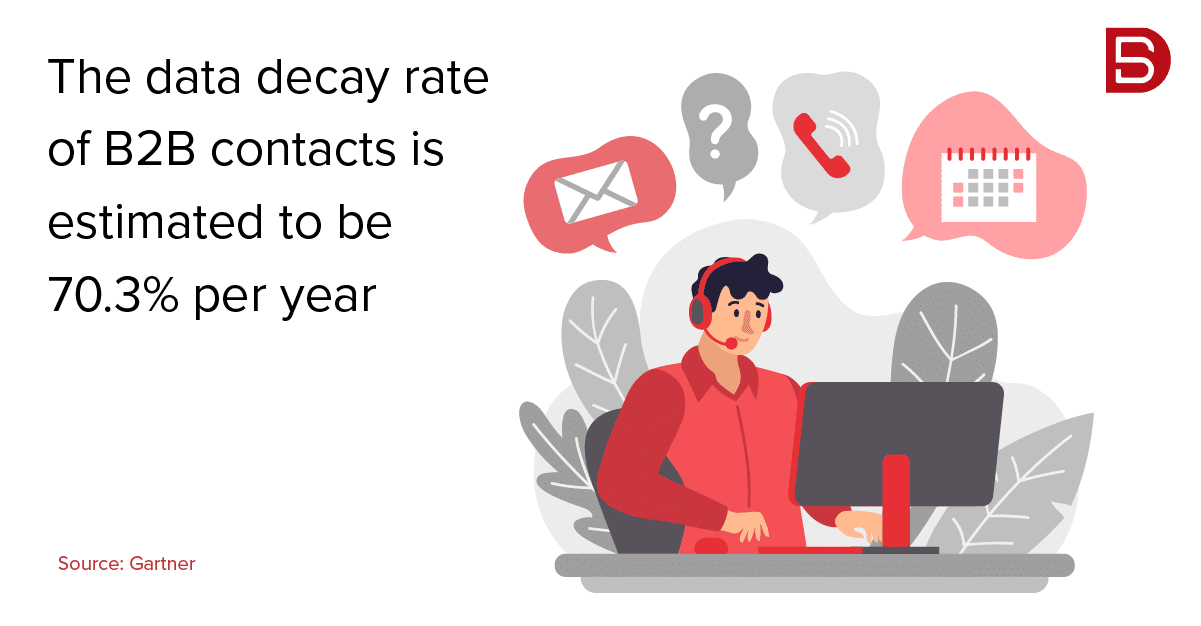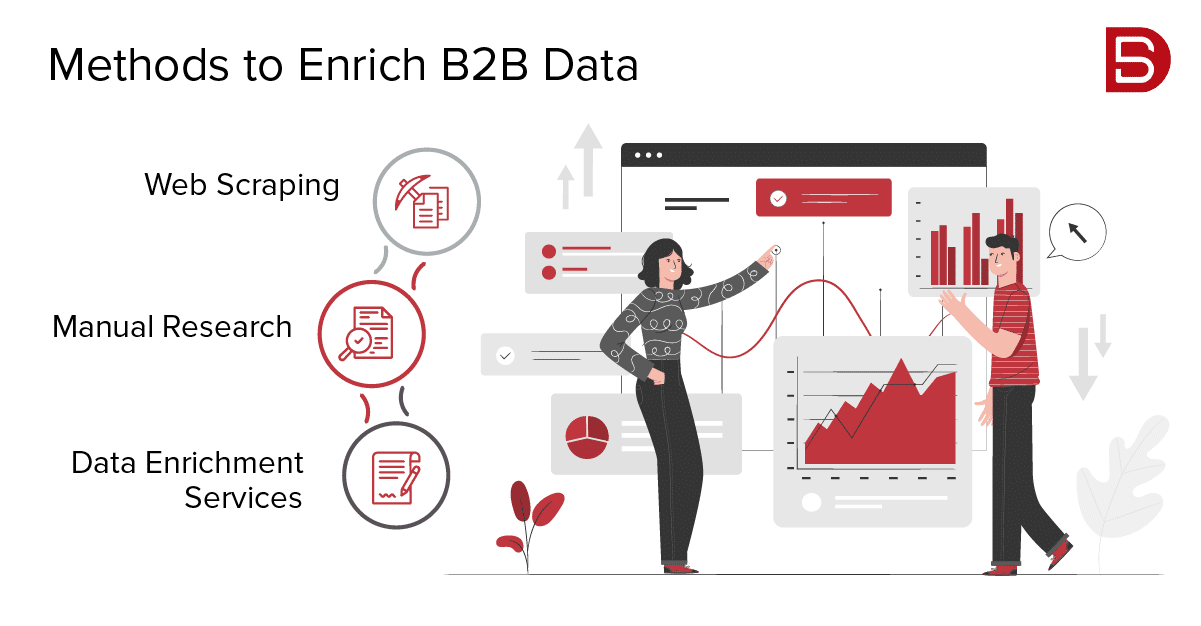In the world of B2B sales and marketing, data takes the crown. Whether trying to understand your ideal customers better or refining how you approach sales, data provides the insights you need to make informed decisions.
It is no surprise that businesses today are attempting to maximize the value of the data in their CRMs. But here’s the thing: if your data isn’t crystal clear, reaching your goals can get tricky. When it comes to B2B contact information, you need both quality and quantity.
Queue B2B data enrichment (CRM enrichment), an often-overlooked component of B2B CRM strategy. When you incorporate data enrichment, you’re essentially opening doors to more business prospects and establishing meaningful connections with your clients.
Before we delve into the details of B2B data enrichment, let’s understand the difference between the often-used interchangeably terms- data enrichment and data cleansing.
Table of Contents
Data Enrichment Vs. Data Cleansing
Data enrichment enhances your CRM by adding valuable information, while data cleansing removes outdated or irrelevant data. Both are crucial for a robust database, usually starting with data cleansing before incorporating new details through data enrichment.
This applies to demographic, regional, and psychographic data in your CRM. Focus on obtaining quality data that accurately represents leads and customers rather than excessive information. When is data cleansing needed? If your email list grows but engagement drops, it’s time to refine your data.
The same goes for additional data used to connect with leads and clients. Compare engagement rates (opens, click-throughs, etc.) with your subscriber count to gauge your database’s health. Apart from tracking data performance, it’s best to perform data cleansing process every six months. Over half of businesses spend more time cleaning data than using it. This isn’t surprising, given accurate data’s value and the cost of using outdated or incorrect information.
Importance of B2B Data Enrichment Process
B2B data often lacks accuracy and can be inconsistent due to its many sources and lack of data quality measures. And here’s the kicker: When you’re aiming for personalized interactions with clients, incomplete or incorrect B2B data can throw a wrench in the works. When your data isn’t up to date, it can mean fewer successful deals and sales processes that seem to drag on forever.
If the data is reliable and pertinent, it can give marketers a plethora of useful information on prospects and clients. This is where CRM and data enrichment come into play. Data enrichment aims to provide you with a complete and accurate picture of your data so your marketing and sales folks can use it effectively.
6 Reasons to Embrace B2B Data Enrichment
Integrating a data enrichment process can be a game-changer for your sales and marketing efforts. Keep reading to discover six compelling reasons why a B2B data enrichment process is essential for success.
1. Enhance engagement by delivering personalized outreach through data segmentation
Whether in marketing or sales, a “spray and pray” approach is a lost cause. To be successful, you must approach your target audience in a more organized and focused manner.
B2B data enrichment allows you to divide your data into specific segments. This precision enables crafting highly focused campaigns for each category, zeroing in on their core value propositions. Consequently, your prospects are more likely to open and engage with emails with greater value and relevance.
2. Enhance sales conversion rates through enriched customer profiles
The accuracy of prospect data forms the backbone of any successful marketing campaign. Even the most meticulously crafted marketing strategy can be derailed by inaccurate data, impacting conversion rates. To truly shine amidst the competition, showcasing your understanding of prospects is essential. And this understanding is intricately tied to the quality of the data you possess about them, enabling you to craft personalized messages that resonate.
Data enrichment companies can help enrich your client profiles by providing comprehensive information about your prospects. A more comprehensive client profile enables you to delve deeper into understanding your contacts and customers.
This groundwork proves invaluable when it’s time to present the solution you’re offering to them, refining your pitch for maximum impact. With accurate and up-to-date information in your arsenal, your chances of fostering positive interactions soar.
By infusing your marketing campaign with the highest caliber of data, data enrichment has the potential to make a substantial impact on sales conversions. This, in turn, propels your marketing efforts to yield a greater return on investment (ROI).
3. Accelerate the sales funnel with an efficient lead-scoring mechanism
Normally, it can take weeks or even months for a lead to convert in the sales funnel. Yet, armed with the correct data, you have the power to fast-track this journey by trimming away the wasted time caused by an ineffective sales process.
With the help of B2B data enrichment services, you can weed out potential customers who don’t meet your ideal client profile and replace them with prospects who do. The more accurate the data, the easier it is to categorize leads based on their likelihood of purchasing via the lead scoring process.
By employing lead scoring, you can pinpoint which leads should take center stage, enabling your teams to focus their efforts where they matter most. This strategic allocation of resources heightens the chances of transforming these leads into successful sales. When your sales pipeline is filled with quality, well-vetted prospects, you will benefit from faster conversions and a shorter sales cycle.
4. Boost web form conversions by using concise lead capture forms
For businesses nowadays, generating leads is of utmost importance. Marketers recognize the significance of snagging inbound leads from various channels – be it your website or social media platforms – and then nurturing them to fuel business growth. The challenge, however, is that potential customers often shy away from tackling lengthy lead capture forms.
A good conversion rate optimization (CRO) strategy depends on creating simple, easy-to-complete forms; form submissions are typically the last barrier to conversion.
Data enrichment technologies promote a win-win situation for both marketers and site visitors. By implementing concise forms that only request vital details, like an email address, marketers create a smoother customer experience for site visitors and increase conversion rates. A data enrichment tool can then assist in gathering more information to develop a more comprehensive client profile.
5. Put an end to data decay with an updated customer database
B2B companies lean heavily on a dependable database for the success of their sales and marketing endeavors. This database includes phone numbers, email addresses, prospect insights, and company details. But, where there’s data, there’s a common concern: data decay.
Over time, this data can turn outdated for various reasons – errors, unreliable sources, or just the passage of time. Data decay affects every database due to job changes, business closures, and mergers that happen quite frequently. Relying on stale data can seriously impact the performance and revenue of your sales and marketing teams.
CRM enrichment is vital in weeding outdated, inaccurate, or unnecessary customer data. This helps your sales team shift their attention to relevant and up-to-date datasets for prospecting. Getting rid of data decay is crucial to guaranteeing your marketing efforts’ effectiveness and preventing potential sales from slipping through the cracks.
6. Stay compliant with company data regulations through data enrichment
Data privacy rules like GDPR and others impose restrictions on the kinds of consumer data that can be stored and for how long. When prospects opt-out or request to be removed from contact lists, data enrichment steps in to help you adhere to these data protection regulations.
With B2B data enrichment, you have the power to clean your database, uphold GDPR-compliant prospect data profiles, and prevent duplicate contacts for more streamlined communication. By outsourcing data quality management services to a reliable partner, you can ensure your business stays aligned with legal standards. Choosing a reputable company that prioritizes compliance and follows GDPR guidelines while enhancing your datasets is essential.
Now that we’ve grasped the importance of embracing B2B data enrichment let’s explore the primary approaches through which you can enrich your data.
3 Ways to Enrich Your B2B Database
1. Web scraping
Web scraping is a technique that automatically collects large volumes of data from the internet. It’s a scalable and cost-effective way to enhance a B2B database. You can use it to import publicly available web data into a CRM or spreadsheet. Scraping is the go-to strategy for quickly acquiring lead data and is ideal for enriching prospect lists. Why? Because you have full control over the data you extract.
You can set up automated workflows to run regularly to ensure your team always has access to enriched data. Just keep in mind that not all internet information is reliable. Thus, you must verify the data before using it in outreach campaigns (for instance, by using an email verification tool).
2. Manual research
Manual data enrichment involves the hands-on process of researching and gathering information about potential leads. This often entails utilizing search engines like Google, professional networking platforms like LinkedIn, and companies’ official websites.
For instance, you might search for key decision-makers in specific industries or companies, gather their contact information, job titles, and other relevant details, and then input this data into a central repository like a CRM or a spreadsheet.
While this method can be effective for managing smaller volumes of data and when you need a personal touch, it becomes quite inefficient when dealing with larger quantities of leads. The manual effort required to research, verify, and input data for a substantial number of prospects can be time-consuming and error prone.
This is where B2B data enrichment services come in handy, offering a more efficient way to process and manage a high volume of prospect data.
Discover How Datamatics Transformed CRM Efficiency with Tailored Contact Solutions
Unleash the Power of Clean Data
Download the case study
3. Data enrichment services
Data enrichment tools or services accomplish three primary objectives:
- Gathering Online Data: They collect information from third-party sources on the web.
- Organizing and Cleaning Data: They structure, clean, and prepare the data for use.
- Combining Data from Multiple Sources: They merge data from different origins into a cohesive dataset.
Managing and collecting data are vital tasks for any business operation. However, given the sheer volume of datasets in a B2B organization, handling data maintenance in-house is not always feasible.
Turning to a reliable third-party data supplier offers a straightforward solution to this challenge. This leads to an important question: What factors should you consider when choosing a data provider?
Factors to Consider Before Choosing a B2B Data Provider for Data Enrichment
Here’s a handy checklist that will serve as your compass in navigating the evaluation process for a B2B data enrichment provider:
• High-quality prospect data
The pivotal factor in picking a B2B data enrichment supplier is determining if they provide high-quality B2B data. Now, the term “quality data” gets thrown around a lot. Before knocking on your B2B data provider’s door for it, let’s take a moment to grasp what it truly means. “Quality data” translates to complete, accurate, and standardized data tailored to suit your unique needs perfectly.
Breaking it into specifics, the quality of B2B data revolves around 5 key aspects:
- Data Relevancy: Ensuring contacts align with your target audience.
- Data Accuracy: Guaranteeing error-free info through human-powered prospecting.
- Data Validity: Confirming prospect details are complete, standardized, and valid.
- Data Completeness: Offering a wide range of necessary data points for each prospect.
- Data Timeliness: Sourcing data in near real-time to counteract data decay.
• Human-powered data processing
To ensure top-notch data quality, a reputable data provider relies on human involvement to some extent. This not only ensures the suitability of data for your business needs but also plays a pivotal role in data verification. For instance, before the data reaches the customer, it’s essential to confirm its accuracy, completeness, and proper structure.
• GDPR compliant research
This method serves as a best-practice approach to verify that your selected B2B data provider follows GDPR in their contact information sourcing.
Reputable data suppliers offer B2B contacts obtained through on-demand GDPR-compliant research, sourcing contact details from instances where the individuals themselves have published the information or from publicly accessible sources.
• Seamless integration with sales tech stack
The connection between your data source and its application hinges on a data enrichment tool seamlessly blending into your sales tech toolbox.
Your B2B data provider should effortlessly mesh your data source with other sales stack tools, including CRM platforms, email clients, and social media networks. This simplifies the process of automatically logging completed marketing activities into your CRM, eliminating the need for manual input.
Wrapping Up
Whether you’re a large corporation or a small startup, B2B data is the foundation of your marketing efforts. However, when it comes to prospect data, data enrichment is the fuel that powers your marketing operations and drives revenue.
All client data in your CRM is fundamentally a snapshot in time. To keep your sales and marketing engine running smoothly, it’s crucial to maintain and update this data continuously. A good data enrichment company not only cleans your contact lists but also adds additional information at the prospect and company levels.
For companies, handling B2B data enrichment internally might not always be the optimal choice, especially when those resources could be directed toward other target-oriented activities. Collaborating with a B2B data enrichment service provider, such as Datamatics Business Solutions Ltd., can offer a smart blend of cost-effectiveness and enhanced productivity. Write to us at marketing@datamaticsbpm.com, and we will have one of our experts reach out to you at the earliest.
 Select an element to maximize. Press ESC to cancel.
Select an element to maximize. Press ESC to cancel.
James Libera




